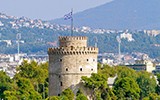Moving to a new destination is complex. It requires plenty of research and thorough planning on your behalf — and still ...
Living in Greece guide for expats
All the information you need to relocate and live in Greece.
Our selection of articles for expatriation in Greece
The country where Hippocrates, the father of Western medicine, was born, has a long way to go toward becoming a medical pioneer ...
Greece is a very child-friendly country. At least, that's what Greeks like to think. The reality is that although people are ...
If everything you've heard about Greece and its financial situation has you slightly disheartened, worry not: you are ...
When considering transportation in Greece, first, you need to consider where you are. Although most cities (even the biggest ...
With the Greek taxation system constantly changing to accommodate the ever-evolving economic recovery measures, it's probably ...
If you're thinking of studying in Greece, you'll certainly be in good company — after all, how many people can ...
Driving in Greece is not for the faint of heart. Apart from the logistics of converting your driving license or having to sit the ...
The telecommunications sector in Greece is one of the very few sectors (housing being the other one) where the financial crisis ...
Starting your own company or being self-employed in Greece is not easy for non-locals, let alone for non-EU citizens. To become ...
Importing a car to Greece can be a complex process that requires proper documentation and adherence to regulations. Whether ...
Greece has a rich culture and gastronomy scene, along with drinking, as well as plenty of things to see and learn, but also ...
Located on the southernmost tip of the Balkan peninsula, Greece boasts a beautiful coastline and small resort islands in the ...
It is possible to open a bank account as an expatriate in Greece, but a residence permit is needed. Having a Greek bank account ...
Diversity and inclusion are becoming increasingly important topics worldwide, and Greece is no exception. Despite being a country ...
About Greece
The truly astonishing thing is that despite the country's tumultuous affair with the IMF and the financial crisis that has wreaked havoc in local businesses, Greece has become an attractive destination for expats, who benefit from the low cost of living as well as from the abundance of sunshine.
History of Greece
Situated in the southeastern corner of Europe, at the crossroads of Africa, Europe and Asia, Greece has been inhabited, since the Palaeolithic period, by sailors, explorers and overly curious people who liked to conquer and 'bring civilisation' to their neighbouring countries. Ancient Greece span through most of coastal Turkey, the Balkans and the southern part of Italy (during the days of Alexander the Great, the empire stretched up to the northwestern India) until it became yet another province of the Roman Empire in 146 BCE and subsequently served mostly as the 'background' to the Byzantine Empire up to 1453 CE, when the Ottomans took over.
But despite its long journey through the ages, the Greece you see is a relatively young state: Modern Greece (or Hellas, as the locals call it) achieved independence from the Ottoman Empire in 1830. After abolishing monarchy in 1974, the country's current government type is a parliamentary democracy, with its main leader being the Prime Minister (currently Alexis Tsipras, the first 'leftist' Prime Minister in modern Greek times). Due to the country's substantial debt and the harsh austerity measures that had to be taken for Greece to be able to stay in the euro, there has been a political upheaval since 2011; overall 6 coalition and provisional governments have been taking over from one another trying to balance between meeting the IMF's demands and placating the (very displeased) Greek public.
How the crisis became an opportunity
During the early 2010s, many of the country's problematic socio-economic structures (like the engrossed civil sector, the lax taxation system and a smorgasbord of closed or restricted professions) stopped being viable; entire sectors of business vanished, taking one million jobs with them. That led the unemployment rate to soar up to 23% and also led thousands of highly skilled and educated young Greeks to seek work abroad.
But Greeks have always been rather inventive -- they had to be, in order to survive for 400 years under Turkish occupation without losing their identity, language or religion. So the crisis also created a radical shift in work mentality. Forgoing its tradition of public-sector jobs, Greece suddenly veered toward creating an export-oriented, globally focused economy driven by technology. Between 2010 and 2013, the number of new startup companies in the country increased tenfold while the capital invested in them shot from â¬500,000 to â¬42m. This new entrepreneurial ecosystem has actually grown even more in the past couple of years, and works as a magnet for both foreign tech-oriented professionals as well as creative individuals who want to work in Greece: the cost to create and sustain a startup, or survive as an artist in Greece is so low, that its capital city, Athens, has often been touted as 'the new Berlin'.
What you need to know about Greece
Greece has the 11th longest coastline in the world (mainly due to its numerous islands) but also 80% of the country consists of mountains or hills. From its literally thousands of islands, only 227 are inhabited, with Crete being the largest of them.
Greece's major regions are:
- Thrace
- Macedonia
- Thessaly
- Epirus
- Central Greece
- Peloponnese
- Aegean Islands
- Ionian Islands
- Crete
The country's population is estimated around 11 million, of which at least 4 million reside in Athens, the capital city. Other cities of note are Thessaloniki (commonly referred to as the 'co-capital'), Patra, Heraklion and Chania (both in Crete), Larissa, Volos, Ioannina, Rhodes and Chalkida. Up until 2011, 90% of the population had a Greek citizenship, but this is changing rapidly due to the refugee crisis -- it is estimated that at least 62,000 people are currently stranded in Greece, fleeing from Syria and other war-torn countries. Although the formal language is Greek, most people (at least in urban areas) are able to understand and communicate in English, whereas it is not uncommon for a Greek to have studied some French, German or Italian.
Religion plays an important part in everyday life. Although there's a steady increa in civil marriages, 50% of them still take place in a church, and not giving your child a 'proper' christening is frowned upon. There are many Roman Catholic, Anglican, Evangelical, Baptist and Protestant churches in big cities such as Athens, Thessaloniki and Patra, as well as two Jewish Synagogues (one in Athens and one in Thessaloniki).
Putting aside the religious issues though, Greeks are very welcoming and warm towards foreigners. They will try to integrate you to their network and help you meet new people, advise you on where to shop, where to eat and where to find the best offers.
Everyday life in Greece, especially in a cosmopolitan city such as Athens is, for the most part, very economical: everything from transportation to entrance to museums is reasonably priced, and you can enjoy a lower cost of living compared with most European cities. Entertainment options (from cinemas and theatres to live concerts) tend to run late, but most of the time you can find restaurants and bars that are still open afterwards. Shops are closed on Sundays though, and many close early on Saturdays too, so you need to schedule your shopping properly.
As for public services, it's best that you do your research beforehand and aim to go as early as possible, because their working schedule is often erratic. That would be a good rule of thumb for every part of your new life in Greece: do as much homework as possible, be prepared that things might take an unexpected turn at any point, but know there's always going to be a friendly Greek to help you out, or at least have a drink with you and listen to your woes afterwards. And if all else fails, look up in the sky: It's probably a glorious, sunny day.
Useful links:
The official website of the Greek Tourism Organization
U.S. Embassy and Consulate in Greece
Greek Organization for Migration
Latest housing offers in Greece
Latest job offers in Greece










